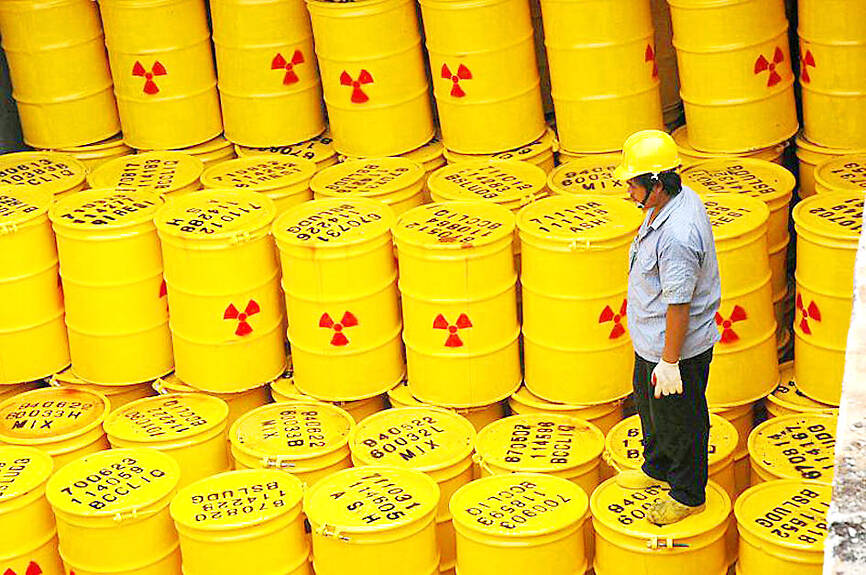DISPOSAL:
An Environmental Jurists Association executive said the rules would spur public participation and make it easier to find a site to dispose of nuclear waste
Environmental groups at a news conference this month proposed a draft bill to regulate how sites are to be selected to store high-level radioactive waste and called on lawmakers to act swiftly on the issue.
Green Citizens’ Action Alliance secretary-general Tsui Shu-hsin (崔愫欣) said that storage facilities holding nuclear waste at nuclear power plants are full and dry cask storage has a service life of only 40 years.
There is no long-term solution for high-level radioactive waste, creating an urgent threat that requires prompt legislation, Tsui said.

Photo: CNA
Taiwan, which as recently as in the first half of the 2010s generated 15 to 20 percent of its electricity from nuclear facilities, has phased out nuclear power. It now generates about 85 percent of its electricity from fossil fuels.
Previous attempts to designate a permanent disposal site for high-level nuclear waste have met strong public resistance.
In 2012, state-run Taiwan Power Co (Taipower) conducted a drilling operation in Hualien County’s Sioulin Township (秀林), sparking speculation that it was scouting for a site to dispose of high-level nuclear waste.
Taipower said the drilling was part of general geological research.
Similar drilling activity was reported in Kinmen County in 2013, again without prior public notice.
The operations sparked fierce backlash over the company’s apparent lack of transparency.
A 2022 Control Yuan report found that no progress had been made in identifying a suitable site.
Chang Yu-yin (張譽尹), an executive director of the Environmental Jurists Association, said that the bill’s comprehensive procedures would encourage public participation and make selection of a site more likely.
The proposal outlines four components of the disposal site selection process, from policymaking and potential candidate sites to candidate and approved sites, Chang said.
It ensures open information and civil participation throughout the process, and prioritizes volunteered locations that would receive compensation of up to NT$10 billion (US$339.44 million), he said.
It also introduces a meeting platform for two-way learning and communication to obtain informed consent from residents of selected sites, he said.
The Ministry of Economic Affairs would be in charge of the legislation, while the Nuclear Safety Commission would be the regulatory authority, Chang said.
An incorporated administrative “radioactive waste management center” would be established as the enforcement authority to ensure separation of powers, he added.
Several groups spent more than three years meeting with academics and others, and consulting the Energy Administration and Taipower to prepare the draft bill, the Environmental Jurists Association wrote on Facebook on July 8.
Taiwan Obasang Political Equality Party Secretary-General Ho Yu-jung (何語蓉) also called for speedy action on legislation.
The proposed rules would regulate the site selection process comprehensively, protect local participation and oversee government responsibilities and monitoring mechanisms, Ho told the news conference.
Green Party Taiwan coconvener Kan Chung-wei (甘崇緯) urged the legislature to review the draft bill and allow reasonable democratic procedures to replace political manipulation.
The ministry in April set up a project management office for radioactive waste management tasked with proposing a draft act on selecting final sites for high-level radioactive waste disposal facilities, as well as platforms to communicate witht he public on the issue.
The ministry’s draft bill is scheduled to be reviewed by the Cabinet at the end of the year.